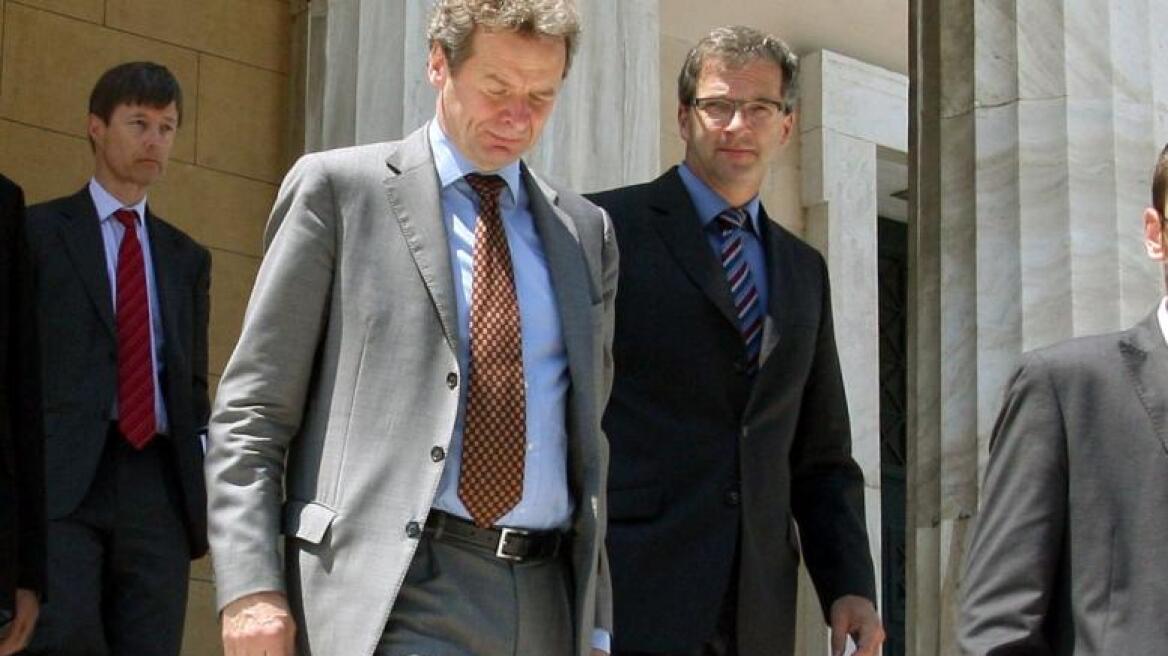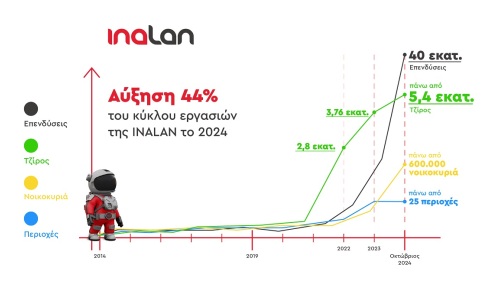
Under the watchful eye of the Troika until the disbursement of the tranche
Under the watchful eye of the Troika until the disbursement of the tranche
From today until the end of April, Troika's auditors will be checking the bills. Athens should comply with 6+6 requirements in order to receive another tranche in June and July.

Troika's goal is to keep checking the government to ensure that all requirements are met. Although all the participants of informal Eurogroup were relieved because Troika has “completed” the audit and monitoring which lasted many months, in fact monitoring will not stop and it will continue until further notice.
From today until the end of April, Troika will check the bills voted by the government, as well as the new bills, so as the European Commission will be able to certify that the EU should give the 6.3 billion.
At the end of April, the IMF will decide to provide 3.6 billion until the mid-May so as Greece will be able to pay the bond of 9.4 billion.
But, in order to get another tranche in June and July (1+1 billion respectively), Greece should meet another 6+6 prerequisites which will be set by the European Commission.
However, before completing the payment of the tranches by EU and IMF, Troika will start auditing and monitoring Greece again. To avoid missing their “ski holidays”, the audit will be made during the summer.
This was clearly described by Commissioner Rehn when he announced yesterday at Zappeio that the next audit will start the following June “and should be completed by September. I hope we will manage to solve any issues and avoid being in Athens during Christmas season”.
From today until the end of April, Troika will check the bills voted by the government, as well as the new bills, so as the European Commission will be able to certify that the EU should give the 6.3 billion.
At the end of April, the IMF will decide to provide 3.6 billion until the mid-May so as Greece will be able to pay the bond of 9.4 billion.
But, in order to get another tranche in June and July (1+1 billion respectively), Greece should meet another 6+6 prerequisites which will be set by the European Commission.
However, before completing the payment of the tranches by EU and IMF, Troika will start auditing and monitoring Greece again. To avoid missing their “ski holidays”, the audit will be made during the summer.
This was clearly described by Commissioner Rehn when he announced yesterday at Zappeio that the next audit will start the following June “and should be completed by September. I hope we will manage to solve any issues and avoid being in Athens during Christmas season”.
But, if the audit completes in 2-2,5 months (since mid-August is a holiday period in Brussels, Frankfurt and Washington), Athens will be in a great stress period until IMF and EU confirm the next tranche.
In the meantime, Athens will also ask for measures to reduce the Greek debt, as the lenders have already committed to. In yesterday's informal Eurogroup in Athens, the European Finance Ministers didn't comment on whether Greece will receive a new lawn. Mr Dijsselbloem said that the Greek government estimates that no new lawn will be needed pointing out that “we would like to agree with this, but it's still too soon.”
Also, regarding the measures for debt relief, he referred to the Eurostat's announcement on validating the primary surplus in 2013, stressing that this is not an issue of immediate importance.
As the Finance Minister said, the financial gap for the next twelve months will be covered by the reserves of the Central Government borrowed by using repos, the denationalization earnings and the return of the Greek economy in markets within the first half-year, borrowing with bonds of 3- 5 years.
“We are happy with the fourth assessment. The Greek Government has advanced a great part of the reforms which will boost the labor market, such as the opening up of the closed professions and reforms in the energy market.” said the Eurogroup's President, Jeroen Dijsselbloem.
The Governor of the European Central Bank , Mario Draghi , said that Greece now begins to see the positive aspects of the program. "We know that pain is great but the picture changes. The most important is to implement fully the agreed structural reforms. "
" The country begins now to understand the first benefits of the program," he said and added, " Many reforms have been implemented, but there are even more agreed reforms that should be applied implemented. Greece can not stop the fiscal adjustment."
Claus Regling of the EFSF noted that the Fund is ready to proceed to payments towards Greece and will be completed as soon as all commitments are covered.
In their announcement, the Eurozone Finance Ministers expressed their satisfaction on the progress made and made it clear that Greece will carry out further reforms with emphasis in Public sector, energy industry and markets.
Meanwhile, the Eurogroup stated that two of the four basic banks have already successfully raised more capital than the supervisory body requires (according to the main scenario) entirely from private investors. This is an encouraging sign for the strengthening of market confidence.
In the meantime, Athens will also ask for measures to reduce the Greek debt, as the lenders have already committed to. In yesterday's informal Eurogroup in Athens, the European Finance Ministers didn't comment on whether Greece will receive a new lawn. Mr Dijsselbloem said that the Greek government estimates that no new lawn will be needed pointing out that “we would like to agree with this, but it's still too soon.”
Also, regarding the measures for debt relief, he referred to the Eurostat's announcement on validating the primary surplus in 2013, stressing that this is not an issue of immediate importance.
As the Finance Minister said, the financial gap for the next twelve months will be covered by the reserves of the Central Government borrowed by using repos, the denationalization earnings and the return of the Greek economy in markets within the first half-year, borrowing with bonds of 3- 5 years.
“We are happy with the fourth assessment. The Greek Government has advanced a great part of the reforms which will boost the labor market, such as the opening up of the closed professions and reforms in the energy market.” said the Eurogroup's President, Jeroen Dijsselbloem.
The Governor of the European Central Bank , Mario Draghi , said that Greece now begins to see the positive aspects of the program. "We know that pain is great but the picture changes. The most important is to implement fully the agreed structural reforms. "
" The country begins now to understand the first benefits of the program," he said and added, " Many reforms have been implemented, but there are even more agreed reforms that should be applied implemented. Greece can not stop the fiscal adjustment."
Claus Regling of the EFSF noted that the Fund is ready to proceed to payments towards Greece and will be completed as soon as all commitments are covered.
In their announcement, the Eurozone Finance Ministers expressed their satisfaction on the progress made and made it clear that Greece will carry out further reforms with emphasis in Public sector, energy industry and markets.
Meanwhile, the Eurogroup stated that two of the four basic banks have already successfully raised more capital than the supervisory body requires (according to the main scenario) entirely from private investors. This is an encouraging sign for the strengthening of market confidence.
Ακολουθήστε το protothema.gr στο Google News και μάθετε πρώτοι όλες τις ειδήσεις
Δείτε όλες τις τελευταίες Ειδήσεις από την Ελλάδα και τον Κόσμο, τη στιγμή που συμβαίνουν, στο Protothema.gr
Δείτε όλες τις τελευταίες Ειδήσεις από την Ελλάδα και τον Κόσμο, τη στιγμή που συμβαίνουν, στο Protothema.gr
ΡΟΗ ΕΙΔΗΣΕΩΝ
Ειδήσεις
Δημοφιλή
Σχολιασμένα






































